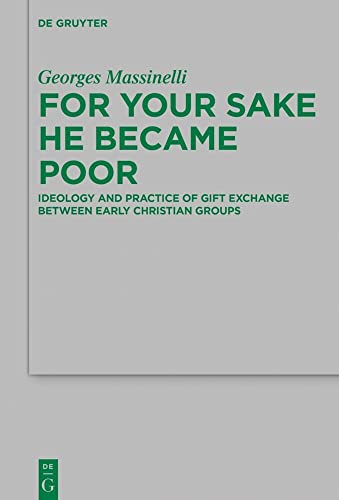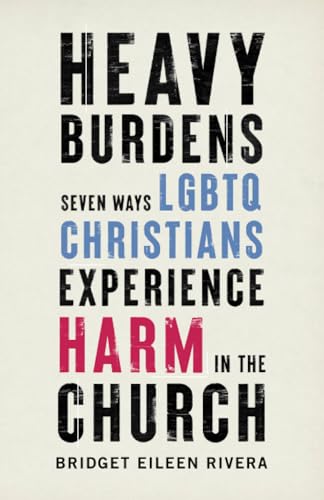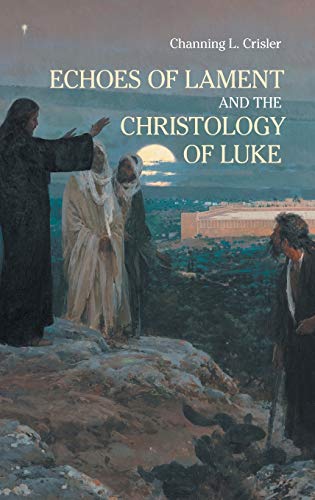For Your Sake He Became Poor: Ideology and Practice of Gift Exchange Between Early Christian Groups
Written by Georges Massinelli Reviewed By J. Brittain BrewerIn the published form of his doctoral dissertation from the University of Notre Dame, Georges Massinelli has written a remarkable new study on the charitable practices of the early church. As the subtitle of the book suggests, the overall contribution is a new frame through which to view early Christian charity, the theological and sociological motivations that lay behind it, as well as its place amongst other types of gift-giving practices. His contribution is a welcome one.
The crux of Massinelli’s argument is a new proposal for understanding the Jerusalem collection and its place in the first few centuries of Christianity, namely that instead of patronage, the Jerusalem Collection should be understood as an early example of intergroup support in the beginning of Christianity. In chapter one, Massinelli lays the groundwork for what is to follow. First, he reviews what he calls “an emerging tendency” (p. 18) to interpret Paul’s collection in light of ancient patronage, which is based on the assumption that benefaction underlies “all extramercantile economic interactions” (p. 18). In the main, this tendency understands Paul to be erecting an anti-patronage system among early Christians, free from reciprocity and power dynamics, as “an intentionally subversive activity that was meant to radically change the social relations of Christians among themselves and with the wider world” (p. 21). Massinelli demurs and offers instead a multifaceted approach to ancient exchange based on John Davis’s idea of a “‘repertoire’ of exchanges” (pp. 34–35). According to Davis’s idea, cultures possess a variety of different types of exchange that should not be reduced. This theoretical approach allows Massinelli to plot out the diversity of exchanges in antiquity and simultaneously argue for a cluster of exchanges in the collection itself. Whereas the dominant scholarly approach reads the collection through the lens of patronage, Massinelli argues “that Paul drew not on a single but on several social conventions of gift exchange, which, along with typical Greco-Roman forms of exchange, included one practice from Jewish tradition (almsgiving) and a specifically Christian exemplum (Christ’s self-giving)” (p. 39).
Chapters 2 and 3 are concerned primarily with sketching out the repertoire of exchange in Greco-Roman culture as well as Judaism. In chapter 2, Massinelli gives a detailed description of patronage and benefaction. While much of what Massinelli covers in this chapter will be review for those familiar with the conversation, he presents the material clearly in such a way that even those unfamiliar with patronage will find it informative and elucidating. His primary concern is to highlight “what the sources reveal about the exploitative dimensions” of patronage and benefaction, not only in Greco-Roman culture, but also in the Jewish communities (p. 46). Having worked through patronage, Massinelli then looks at ancient sources to summarize a variety of different types of exchange in chapter three. Attending to the “full complexity and heterogeneity of gift exchange within the world of nascent Christianity” (p. 112), he places the different types of exchange in two general groups: reciprocal exchange, gifts that are “upheld by virtue of the norm of reciprocity” (p. 113), and non-reciprocal exchange, gifts that escaped such norms p. 135). Massinelli’s helpful survey demonstrates quite clearly that exchange was not a single model in antiquity but was both multilayered and multifacted, adaptable to several different situations. Boundaries were not clear cut but were “easily permeable and subject to manipulation” (p. 172).
The next two chapters contain the bulk of Massinelli’s exegetical work of 2 Corinthians 8–9, which is nothing short of exemplary. The basic claim of chapter 4 is that the primary concerns of the Corinthian church with Paul’s collection request were two: “the fear of impoverishment … and a mistrust of Paul’s leadership” (p. 222). This is directly contrary to those who see the collection in terms of patronage, in which issues of “status hierarchy and obligation” are the primary concerns (p. 223). Hierarchy and obligation appear, but not necessarily in positive terms. In terms of hierarchy, Massinelli argues that the Corinthian church is acting like a client, afraid of exploitation, rather than as a patron giving benefits (p. 197). Therefore, when Paul does bring up issues of hierarchy, he does so in order to stress equality, rather than subservience or superiority (2 Cor 8:13–15). And Paul is insistent that giving should be done, not out of obligation but out of liberal generosity (2 Cor 8:3, 12; 9:7). And he does this not because of any perceived obligation to Jerusalem, but, as Massinelli suggests, because of a perceived obligation to Paul, displaying Paul’s aversion to heavy-handed leadership and a concern for the liberty of early Christian groups.
Having placed the concerns of impoverishment and leadership in the background, Massinelli then analyzes Paul’s language of the collection to determine what types of exchange can be identified in it, or the repertoire of exchange. The most important term for Paul is simply χάρις, “gift.” Here Massinelli provides a rich and persuasive reading of the collection texts that show Paul’s concern is not sociological, but theological: “Despite the material exchange that takes place between them, the language of χάρις fails to put Corinth and Jerusalem in relation directly with one another. They apparently interact only with God” (p. 230).
The final chapter places the Jerusalem collection in the context of early Christian intergroup support. Each instance of support shares four main features that unify them: similar patterns of collection and distribution, given because of persecution and imprisonment, the support spans the ancient world, and each gift, overseen by a bishop or leader, contributed to the prominence of certain churches and church authorities (pp. 280–81). Here Massinelli provides a great service by showing clearly how the Jerusalem collection fits within the broader stream of intergroup support. What Paul did was not unique to early church but was apparently the first of several similar collections.
In terms of style alone, For Your Sake He Became Poor is a salutary example of how academic writing should be done. This may be the most well-written dissertation that I have read. The subject matter is dense, but Massinelli’s style is lucid and exact. He lays out his arguments clearly and accessibly so that even a non-specialist can follow along, summarizing and synthesizing mountains of data in ways that are both manageable and yet also substantive.
Of the voluminous literature on the Jerusalem Collection and early Christian ideologies on gift-giving, Massinelli’s contribution stands out as an important volume. Previous scholarship is summarized adeptly and the argument, brilliantly simple, ably adds to the discussions on how Christians supported one another, and why. There is plenty here to chew on and consider as it relates to Pauline theology. Perhaps the chief takeaway, though, is the helpful pushback to the current obsession with patronage and benefaction in Paul. As Massinelli shows, ancient gift-giving was not nearly so monochromatic, and Paul’s thought is much more complex than a simple identification will allow. Such an approach may provide nuance to the recent work of Barclay and others.
J. Brittain Brewer
J. Brittain Brewer
Calvin Theological Seminary
Grand Rapids, Michigan, USA
Other Articles in this Issue
This article examines Christopher Nolan’s three most recent films, Interstellar (2014), Dunkirk (2017), and Tenet (2020), through the lens of Christianity’s preeminent theological virtues: love, hope, and faith, respectively...
Syncretism—the blending of two or more religious paradigms—threatens Christian witness around the world...
Revisiting “the Time of Abiathar the High Priest”: Interpretation, Methodology and Ways Forward for Understanding Mark 2:26
by William B. BowesMark 2:26 has presented itself as a difficult textual and historical problem for interpreters...
Give Honor and Vote? A Reflection on the Christian’s Voting Conscience and Romans 13:1–7
by Robert GoldingPaul’s instruction in Romans 13:1–7 can be applied to Christian voting behavior in the West...
Hell for a Single Sin: A Response to Robert Golding’s Asymptotic Theory of Those in Hell
by Paul DirksThis article is a response to Robert Golding’s recent essay, “Making Sense of Hell,” in which he contends for the logic of eternal punishment on the basis of a progressive and asymptotic conception of sin and sinners in hell...






